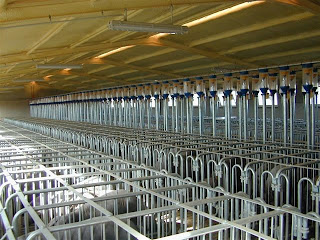I've noticed an unwarranted bias in America against mass-produced food. I suspect it is because most mass-produced American food isn't very good. Also, the best mass-produced food (e.g. jamon iberico) is marketed as if it isn't mass-produced.
All this leads to people making incorrect assumptions about the potential to produce great mass-produced food.
Most American food companies produce for the price-sensitive American consumer, not the quality-sensitive consumer. The ones that do produce for the quality-sensitive consumer (e.g. Lindt's American subsidiary) often try to hide their American status; because with products like chocolate, it is a stigma to be made in America.
When I lived in Europe, I rarely saw American food. When I went to the food section at Hertie, I'd see all sorts of non-German stuff, but very little of it was American. The few American products really stood out. One that was clearly very popular was Kraft cream cheese. I later heard plenty of Europeans talk about that cheese and how much they loved it, even though Schmelzkaese and other European cheeses are similar.
Later on I read a fascinating article about how Kraft is the dominant company in cream cheese, because they know how to make cream cheese better than all others - big, small, organic, conventional, "local", biodynamic etc. I think it is interesting that:
- There are essentially no "artisanal" cream cheese manufacturers worth talking about.
- Kraft, a gigantic food company, makes a world-class product. Because of Kraft, we can proudly say that America produces at least one cheese that the world loves - in the same way that we love Italian parmesan.
Farming processes, optimized to produce excellent tasting food, don't have to look traditional in order to beat traditional producers on eating quality. Those small producers who can't even get the basics right (e.g. breed and feed) aren't going to beat modern producers who optimize that for meat qualtiy. Iberico hogs, carefully raised in confinement, taste better than meat-type hogs - even those raised by loving small farmers practicing traditional farming.
Because producing good tasting food is about chemistry and processes, it isn't surprising that large companies can produce that stuff better than "artisans", in the same way that drug companies are better at producing medicines than home chemists. The fact that a home chemist uses "organic" techniques or "local" ingredients isn't going to necessarily make better products, and may even lead to lower quality results, by constraining the selection of inputs.
Of course, small producers can produce better results than big producers - they just need to be very good.




No comments:
Post a Comment